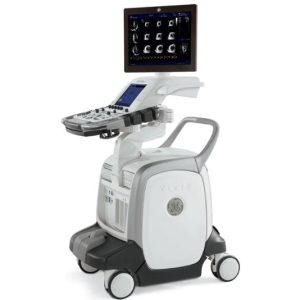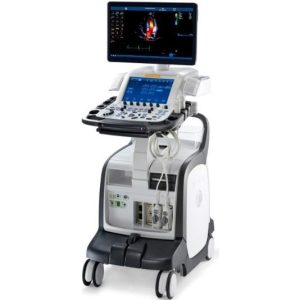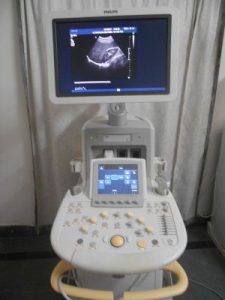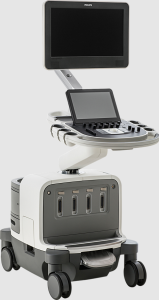GE Vivid E95 Versus the Top Ultrasound Machines

Top medical practices require premium ultrasound machines with advanced imaging capabilities, powerful processing speeds, and workflow efficiency tools to deliver high-quality patient care.
Several premium ultrasound machines on the market provide exceptional image quality and powerful performance across multiple clinical settings. But despite their equally impressive performance, each device also offers unique benefits not found in its competitors, which may determine your purchase.
This article aims to simplify your ultrasound purchasing decision by introducing the GE Vivid E95 and comparing it to three other top ultrasound alternatives – the GE Vivid E90, the Philips iU22, and the Philips EPIQ 7.
We detail each machine’s standout features, clinical strengths and weaknesses, and price-to-performance value to help you determine the best ultrasound machine for your medical practice.
| Ultrasound Machine | Details |
| GE Vivid E95 | Price Range: $65,000 to $97,500 Monitor Size: 22 inches Imaging Modes: 2D/3D/4D Probe Ports: 4 probe ports Controls: Knobs, buttons, trackball, and 12-inch touchscreen Applications: Cardiac, OB/GYN, MSK, Vascular, 4D Key Features: B-Flow, M-Mode, Anatomical M-Mode, Color Doppler, CW Doppler, PW Doppler, Power Doppler, Tissue Doppler, Tissue harmonic imaging, Tissue Tracking, Tissue synchronization, 3D/4D cardiac, Stress echo, Continuous high pulse repetition frequency, IMT, Compound imaging, Strain and strain rate, Needle visualization, DICOM 3.1, Speckle reduction, Tomographic, Auto ejection fraction, 4D auto LVQ, Auto AVQ, Auto EF, AFI stress |
| GE Vivid E90 | Price Range: $62,000 to $93,000 Monitor Size: 22 inches Imaging Modes: 2D/3D Probe Ports: 4 probe ports Controls: Knobs, buttons, trackball, and 12-inch touchscreen Applications: Cardiac, OB/GYN, MSK, Vascular Key Features: B-Flow, M-Mode, Anatomical M-Mode, Color Doppler, CW Doppler, PW Doppler, Power Doppler, Tissue Doppler, Tissue harmonic imaging, Tissue Tracking, Tissue synchronization, 3D/4D cardiac, Stress echo, Continuous high pulse repetition frequency, IMT, Compound imaging, Strain and strain rate, Needle visualization, DICOM 3.1, Speckle reduction, Tomographic, Auto ejection fraction |
| Philips iU22 | Price Range: $15,000 to $22,500 Monitor Size: 17 inches Imaging Modes: 2D/3D/4D Probe Ports: 3 probe ports Controls: Touchscreen, knobs, buttons, and trackball Applications: Cardiac, OB/GYN, Vascular, Urology, MSK Key Features: M-Mode, Color Doppler, CW Doppler, PW Doppler, Tissue Doppler, Tissue harmonic imaging, Needle recognition, Compound imaging, Auto IMT, Speckle reduction, Strain and strain rate, Strain elastography, Shear wave elastography, Auto optimization, DICOM 3.1,3D/4D, Panoramic, Continuous high pulse repetition frequency, STIC, Stress echo, CD/DVD-R drive |
| Philips EPIQ 7 | Price Range: $47,500 to $71,250 Monitor Size: 21.5 inches Imaging Modes: 2D/3D/4D Probe Ports: 4 probe ports Controls: Touchscreen, knobs, and trackball Applications: Cardiac, OB/GYN, Vascular, MSK, Urology, 4D Key Features: M-Mode, Anatomical M-Mode, Color M-Mode, Color Doppler, CW Doppler, PW Doppler, Tissue Doppler, Intelligent Doppler, Continuous high pulse repetition frequency, 3D/4D, Panoramic, Strain, and strain rate, Stress echo, Auto optimization, Compound imaging, Speckle reduction, STIC, Tissue harmonic imaging, PureWave transducers, Auto IMT, Automated LH measurement, Cardiac motion quantification, AutoEF.Live dual-mode, Shear wave elastography, Needle recognition |
GE Vivid E95 Vs. Similar Models
The Vivid E95 is one of GE’s most highly-rated premium ultrasound machines for hospitals and imaging facilities across various medical specialties. It is a shared service device with clinical applications for Cardiac, OB/GYN, Vascular, MSK, and more.
The GE Vivid E95’s extensive collection of advanced imaging features makes it a superb option for most medical practices. But depending on the imaging needs of your practice, you may find greater satisfaction in one of its alternatives.
The GE Vivid E90, Philips iU22, and Philips Epiq 7 are all premium shared service devices that offer phenomenal imaging performance in various clinical settings. In the next section, we break down each machine’s unique features, pros, and cons to help prospective buyers identify the best fit for their medical practice.
GE Vivid E95
As a premium ultrasound machine, the GE Vivid E95 has leading-edge software and hardware features that render powerful processing speeds and spectacular image quality.
One of the best features in the GE Vivid E95 is its 4D imaging mode, allowing clinicians to view feature-rich video of patient anatomy in high-definition.
The GE Vivid E95’s array of 4D imaging capabilities includes HD Live imaging, 4D Auto LVQ, and 4D Auto AVQ. Using the 4D Auto LVQ and AVQ features for cardiac exams, clinicians get automated measurements of various left ventricular and aortic annulus parameters, including volume, ejection fraction, dimension, area, and circumference.
The GE Vivid E95 runs on an advanced image processing software called cSound. This innovative technology addresses the limitations of today’s ultrasound systems for scanning hard-to-image patients.
The cSound feature uses advanced beamformer technology to introduce a new level of versatility and imaging power. It has a deeper scanning depth and enhances image resolution at every level, providing more precise imaging in physically large patients.
Another distinguishing feature of the GE Vivid E95 includes compatibility with multiple XDclear transducer options. XDclear is GE’s most advanced transducer technology, designed to enhance image quality for 2D, 3D, color, and Doppler imaging.
Using XDclear, clinicians can achieve crystal clear imaging, detailed anatomical insight, and comprehensive quantitative assessment for various clinical exams and procedures.
The price of the GE Vivid E95 ranges between $65,000 and $97,500.
Pros:
- AFI Stress feature automates 2D speckle tracking to measure in real-time the deformation (strain) of the myocardial wall
- M-Mode and Anatomical M-Mode features for accurate, real-time measurements of various echocardiographic parameters
- Multiple Doppler modes for optimal visualization of blow flow (Color, CW, PW, Power, and Tissue Doppler)
- Tissue Harmonic Imaging feature that improves image clarity by enhancing edge detection so patient anatomy is clearly define
- Strain Rate imaging feature allows clinicians to assess myocardial function
- Auto Intima-Media Thickness (IMT) measurement of anterior and posterior walls for accurate carotid status
- Auto ejection fraction feature provides an automated measurement of the left ventricular ejection fraction (LVEF) during cardiac exams
- Speckle Reduction feature improves the quality of B-Mode scanning by reducing artifacts
- Continuous high pulse repetition frequency
- Needle visualization feature for precise needle and catheter placements
- DICOM 3.1 compatibility lets users send and receive patient data across other devices
Cons:
- No Shear Wave Elastography
- No Intracardiac Echo (ICE)
GE Vivid E90
Like the Vivid E95, the GE Vivid E90 is a shared service device that performs particularly well for cardiovascular imaging. It has almost all of the same features found in the Vivid E95, including XDClear transducer technology and cSound software.
The major difference between the Vivid E90 and Vivid 95 is that the Vivid E90 does not have a 4D imaging mode.
Besides 4D imaging, the GE Vivid E90 has many other notable features. Among them is Scan Assistant Pro – a customizable tool that lets clinicians save scanning protocols for routine imaging exams and decrease keystrokes up to 60~70%.
The GE Vivid E90 also has multiple advanced Doppler modes, allowing clinicians to visualize and measure blood flow with incredible precision. The Vivid E90’s Doppler modes include:
- Color Doppler
- Continuous-Wave (CW) Doppler
- Pulsed-Wave (PW) Doppler
- Power Doppler
- Tissue Doppler
The lack of a 4D image mode lowers the starting price of the GE Vivid E90 slightly below the Vivid E95, costing between $62,000 and $93,000.
Pros:
- M-Mode and Anatomical M-Mode features for accurate, real-time measurements of various echocardiographic parameters
- Strain Rate imaging feature allows clinicians to assess myocardial function
- Auto ejection fraction feature provides an automated measurement of the left ventricular ejection fraction (LVEF) during cardiac exams
- Auto Intima-Media Thickness (IMT) measurement of anterior and posterior walls for accurate carotid status
- Speckle Reduction feature improves the quality of B-Mode scanning by reducing artifacts
- Tissue Harmonic Imaging feature that improves image clarity by enhancing edge detection so patient anatomy is clearly defined
- Continuous high pulse repetition frequency
- Needle visualization feature for precise needle and catheter placements
- DICOM 3.1 compatibility lets users send and receive patient data across other devices
Cons:
- No 4D imaging mode
- No HD Live imaging
- No Shear Wave Elastography
Philips iU22
The Philips iU22 has been an industry-leading premium ultrasound machine for over a decade. It offers a wide range of advanced imaging features and produces crisp, high-definition images on a 22” OLED monitor. The iU22 console has three probe ports and an intelligent control panel that facilitates easier navigation and an intuitive workflow.
Similar to the GE Vivid E95, the Philips iU22 is a shared service ultrasound machine that offers premium 2D, 3D, and 4D imaging across multiple clinical applications, including:
- Pediatrics
- Radiology
- Cardiac
- OB/GYN
- Vascular, Musculoskeletal
- Urology
- And more
The Philips iU22 rivals the GE Vivid E95’s XDclear technology with its own xMatrix transducer technology. The Philips iU22 has a wide range of xMatrix transducers for remarkably clear imaging, including:
- Broadband
- Volume sector
- Linear-array
- Curved linear array
- TEE
- Doppler pencil
The Philips iU22 stands out from ultrasound machines of competing brands with cutting-edge features like InFocus Imaging, allowing physicians to get deeper penetration in hard-to-image patients while preserving image quality at every depth.
Additionally, clinicians cut down exam times using the iU22’s iScan tool – an advanced feature that automatically optimizes image quality at the touch of a button.
The Philips iU22 costs between $60,000 and $90,000.
Pros:
- iCommand voice recognition with over 2300 commands so users can control their device hands-free for improved imaging flexibility
- QLAB software allows clinicians to easily expand patient diagnostic information, and with several assessment and analysis apps
- Custom Tissue Imaging lets users adjust scans to specific body types while preserving the image’s resolution
- Modality Compare feature allows clinicians to view side-by-side images from other imaging modalities during scans
- InTune Transducer Technology matches transducers to the best acoustics for each clinical use to optimize patient diagnostic exams
Cons:
- Heavier console with a larger base, making it slightly less transportable than its competitors
- No HD Live Imaging
- No B-flow feature
Philips EPIQ 7
The Philips EPIQ 7 is a premium shared-service ultrasound machine with clinical applications for Cardiac, OB/GYN, Vascular, Urology, Musculoskeletal, and a host of others.
Similar to the GE Vivid E95, the Philips EPIQ 7 performs exceptionally well for cardiac imaging.
Advanced cardiac features like Cardiac Motion Quantification (CMQ) provides cardiologists with automated measurements of cardiac function, such as end-systolic volume (ESV).
The Philips EPIQ 7 also performs Spatio-temporal Image Correlation (STIC) – an automatic volume acquisition through the fetal heart, resulting in a complete fetal cardiac cycle displayed in motion in an endless 3D cineloop sequence.
Additionally, the Philips EPIQ 7 has Anatomical Intelligence for Breasts technology, making it one of the best ultrasounds for women’s healthcare. The AI for Breasts feature guides clinicians during breast screenings and increases reproducibility for follow-up exams.
Other stand-out features in the Philips EPIQ 7 include PureWave crystal transducers, TrueVue advanced 3D Display, and MaxVue HD Display, providing remarkably lifelike 3D images and a more realistic display of patient anatomy.
The price of the Philips EPIQ 7 ranges between $47,500 and $71,250.
Pros:
- nSight technology that increases ultrasound penetration by 76% for optimal imaging in hard-to-image patients
- MicroCPA for better visualization of tiny vessels and organ perfusion
- Shear wave elastography for improved liver assessment and evaluation of tissue elasticity of various traumatic and pathologic MSK cases
- M-Mode, Anatomical M-Mode, and Color M-Mode for accurate, real-time measurements of various echocardiographic parameters
- Various Dopper settings, including Color, CW, PW, Tissue, and Intelligent Doppler
- Needle Recognition for precise needle and catheter placements
Cons:
- 45 min back-up battery life is shorter than some of its competitors
- No HD Live Imaging
- No B-Flow feature
What to Consider When Buying an Ultrasound Machine
The ideal outcome for most prospective ultrasound buyers is to find a machine within their budget that satisfies the full scope of their medical practice’s imaging needs.
To achieve this, it is critical to clearly define the intended clinical use of your ultrasound machine before making a purchase. Buyers should also determine the advanced features they need for their practice and ensure the device is compatible with their existing software.
Intended Clinical Use
The intended clinical use of your device is one of the most important factors to consider when buying an ultrasound machine. Most medical practices benefit from buying a shared service ultrasound machine that they can use in multiple clinical settings.
But, in other cases, a shared-service system may not be the best. For instance, an OB/GYN clinic would likely be better off with an OB/GYN-centric ultrasound machine. The same can be said for a cardiology clinic and cardiac-focused ultrasound machines.
Buyers should also consider if they will use their ultrasound machine for diagnostic purposes, treatment, or both – this will determine the key system features to seek out.
For example, surgical teams and anesthesiologists often use ultrasounds for perioperative purposes and will benefit from purchasing a device with advanced features like Needle Recognition for precise needle or catheter placements.
What kind of features do you want?
The features you want in your ultrasound machine will be determined by several factors, including:
- Your medical specialty
- The type of procedures you do
- Your patient population
OB/GYN practices that routinely care for pregnant women typically seek out ultrasound systems with 4D and HD Live imaging, which allows expecting parents to see high-definition video of their baby inside the womb. Vascular care units benefit from features like MicroCPA, which allows clinicians to observe tiny vessels and organ perfusion with greater accuracy.
Is it compatible with your healthcare software?
Ultrasound images are often stored, shared, and compared to other forms of patient diagnostic data from different imaging modalities. The most efficiently run medical practices ensure that all of their medical devices are compatible with each other and with their computer software so that the transmission of patient files is seamless and secure. Today, DICOM 3.0 is the most common software.
Why Buy From Strata?
The GE Vivid E95, GE Vivid E90, Philips iU22, and Philips EPIQ 7 are all premium shared service ultrasound machines with exceptional performance for cardiac imaging.
In addition to the four ultrasound machines compared in this article, Strata Imaging offers complete rental, maintenance, repair, and sale of almost every type of ultrasound machine and related peripherals to all 50 states.
Browse our extensive catalog of ultrasound equipment to find the best fit for your medical practice.
When you buy from Strata Imaging, you get more than a first-class machine at a great price. You can also access our expert repair team and knowledgeable customer service reps.
Give us a call today at 866-770-9605 or fill out this form with any questions you have, and our dedicated service team will gladly assist you.
Contact for Price Quote
If you are in need of an affordable option and are looking to save 30-60% over new OEM prices then allow our knowledgeable customer service and expert team to assist you in developing a solution that fits your requirements.
We offer solutions with a 100% satisfaction guarantee, ensuring you receive the best value for your investment.
FDA Certified Products
Factory OEM Specifications
100% Guarantee
Our clients
Trust Others From Around The World
Served over 4,000 Ultrasound and C-Arm Clients since 2004





